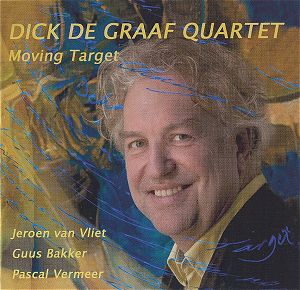1.Cascade [6:59]
2. A touch of Bela [5:37]
3. Deka deka [6:17]
4. Stolen dream [4:23]
5. Climate Change [4:33]
6. Why Birds Always Sing [5:59]
7. Moving Target [5:32]
8. Handicap [4:28]
9. Somsok Orkim Saleb II [5:21]
10. Démasqué [7:44].
Total time: [56:53]
All compositions by Dick de Graaf.
The Dick de Graaf Quartet:
Dick de Graaf: Tenor & soprano Sax
Jeroen van Vliet: Piano & Fender Rhodes
Guus Bakker: Acoustic & Electric Bass
Pascal Vermeer: Drums.
Recorded and Mixed at Tafelberg Studio, Tilburg,
Netherlands on October 19th and
20th and November 9th,
2006.
Dick de Graaf is a great sax player who is
proof, if proof were needed, that Europe is
the home of great jazz musicians and that
the USA is not the only country where they
are found. A great shame then that people
such as he are not better known. On this disc
are some great tunes all penned by him and
played with consummate ease and panache by
him and his quartet. Deka Deka is a new arrangement
of Second Trying, the opening tune on HOT,
HAZY AND HUMID (Limetree Records, 1986), his
first recording as bandleader, while Cascade,
Climate Change and Démasqué
were written only in 2006. A Touch of Bela,
Handiclap, Somsok Orkim Saleb II, Stolen Dream
and Why Birds Always Sing are part of a larger
project that he was commissioned to write
by Robert Maloschik for Radio Magyar in Budapest
and are inspired by piano and choral works
by bela Bartok. The Moving Target of the album
title is a new arrangement of a tune Dick
de Graaf wrote in 1996 and that encapsulates
his take on life "Moving targets are
harder to hit". The album as a whole
is mostly fast paced, very listenable and
extremely enjoyable. Stolen Dream is a beautiful
tune in ballad style with some gorgeous solos
from pianist Jeroen van Vliet and bassist
Guus Bakker as well as de Graaf himself and
though I couldnít readily discern the Bartokian
influence I am grateful for it if it inspires
such super jazz. Climate Change is another
slower paced tune with some really fancy work
from Guus Bakkerís electric bass. Why Birds
Always Sing, another Bartok inspired song
is more easily recognised as coming to us
via the great Hungarian composer and wouldnít
it be great if it led to those listeners who
donít know him to explore Bartokís work which
is so fantastically rewarding. Iíve only picked
a few tracks to concentrate on but all are
really great tunes and demonstrate de Graafís
highly individual compositional talents. A
highly recommended disc. As I recently said
of another jazz disc I reviewed by Gregg August,
whose disc is also all original compositions,
it would be nice to hear Dick de Graaf tackle
some standards, which no doubt he has in the
past so Iím off to seek them out!
Steve Arloff
